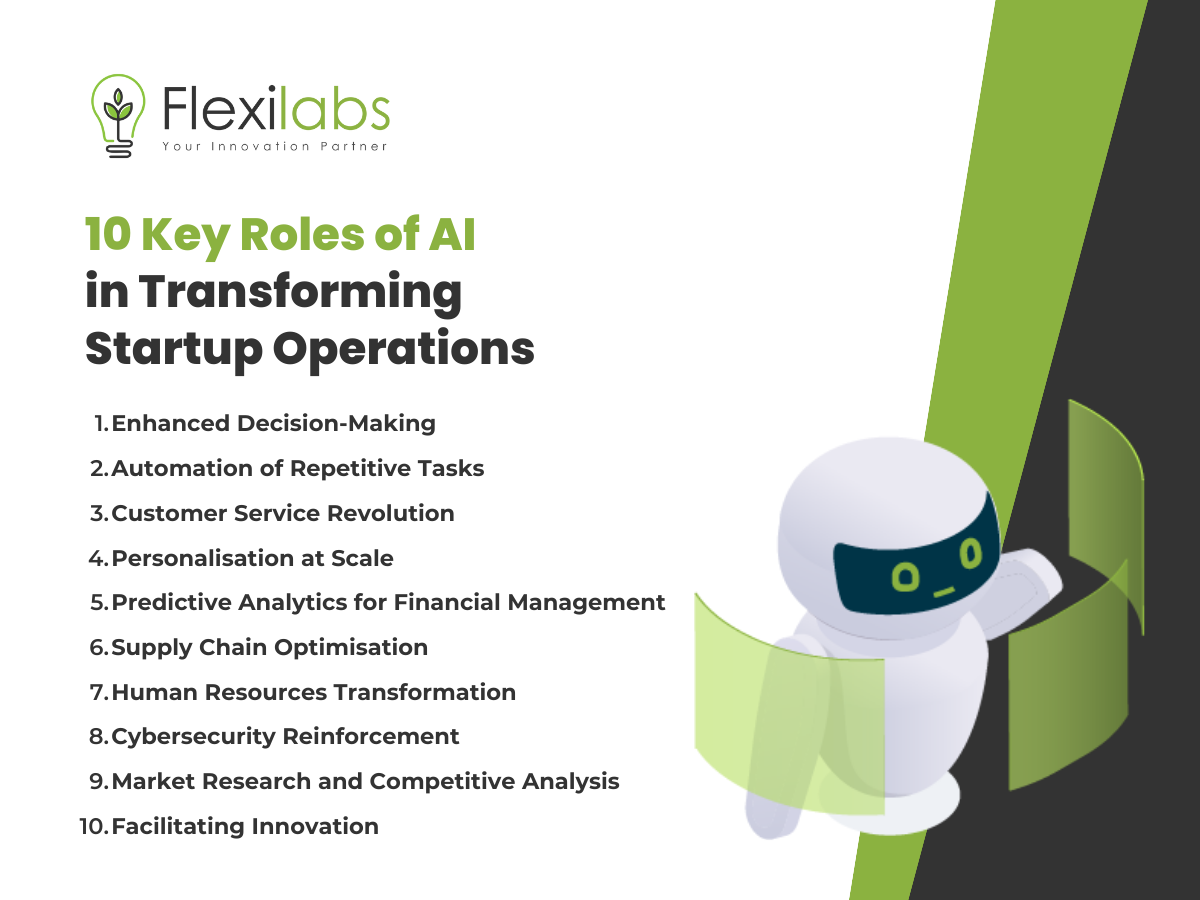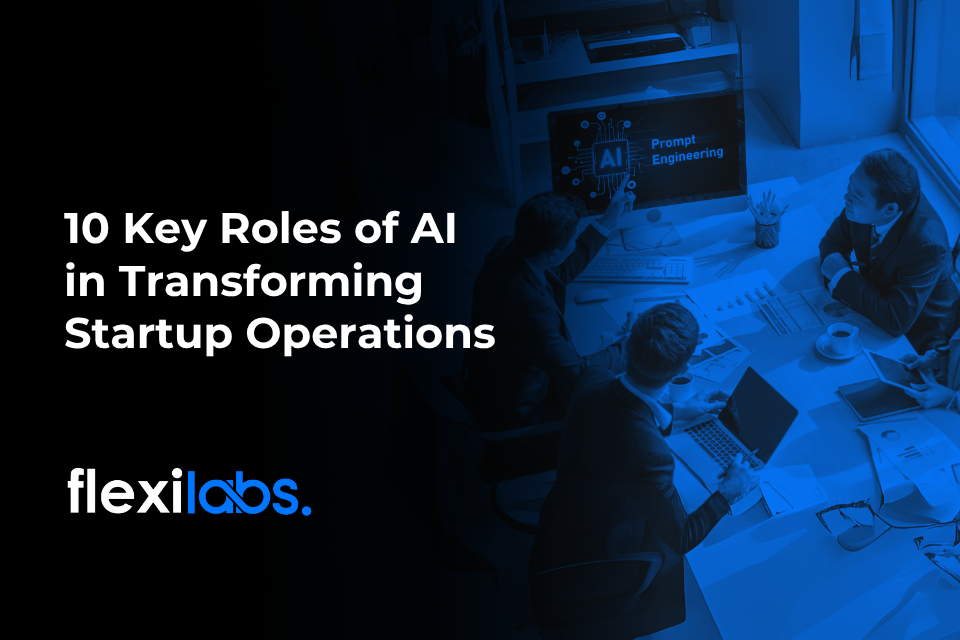In the ever-evolving landscape of business, startups are leveraging the power of AI to revolutionise their operations and navigate the challenges of the modern marketplace. From automating routine tasks to predicting business trends and enhancing customer experiences, AI has become an indispensable ally for startups aiming to survive and thrive in today’s competitive business environment.
Likewise, in this article, we will explore the dynamic ways in which AI is reshaping the startup ecosystem, playing a pivotal role in driving efficiency, innovation, and strategic decision-making. Join us as we delve into the 10 key roles Artificial Intelligence plays in reshaping the future of startups, ushering in a new era of possibilities and opportunities.
What is Artificial Intelligence in Startups?
In simple terms, Artificial Intelligence (AI) refers to the development of computer systems that can perform tasks that would typically require human intelligence. These tasks include understanding natural language, recognising patterns, learning from data, and making predictions or recommendations.
Lately, however, AI has emerged as a disruptive force in the startup ecosystem, reshaping how businesses operate, make decisions, and deliver value to customers. In the context of startups, it encompasses diverse technologies and applications that leverage machine learning and other advanced algorithms to automate tasks, gain insights from data, and drive innovation.
10 Key Roles of AI in Transforming Startup Operations
Like any other technology, AI plays a crucial role in transforming startup operations by enhancing efficiency, innovation, and decision-making. Here are 10 key roles and impacts of AI in startups:

1. Enhanced Decision-Making
One of the primary roles of AI in startup operations is its ability to enhance decision-making processes. Startups deal with an immense amount of data daily, and AI can analyse this data swiftly, providing actionable insights. Machine learning algorithms can identify data patterns, trends, and correlations, enabling entrepreneurs to make informed decisions. Whether optimising marketing strategies or predicting market trends, AI empowers startups to make decisions based on data-driven intelligence rather than gut feeling.
2. Automation of Repetitive Tasks
Startups often grapple with resource constraints, and repetitive tasks can drain manpower. In startups, AI excels in automating routine and mundane tasks, allowing startup teams to focus on more strategic and creative endeavours. From data entry to customer support, AI-driven automation enhances efficiency and productivity. This saves time and reduces the likelihood of errors associated with manual processes.
3. Customer Service Revolution
Exceptional customer service is a cornerstone of startup success, and AI is revolutionising this aspect of operations. Chatbots and virtual assistants powered by AI can handle routine customer queries, provide instant responses, and even assist in resolving more complex issues. This improves customer satisfaction and frees up human resources to address more complex and nuanced customer needs.
4. Personalisation at Scale
Understanding and catering to the unique needs of individual customers is a significant challenge for startups as they scale. AI in startups enables businesses to achieve personalisation at scale by analysing customer behaviour and preferences. Recommender systems, powered by machine learning algorithms, can suggest personalised products or content, enhancing the overall customer experience and boosting engagement.
5. Predictive Analytics for Financial Management
Financial management is critical to startup operations, particularly financial and fintech businesses. And AI brings predictive analytics to the forefront of this domain. Machine learning algorithms can analyse historical financial data, market trends, and external factors to predict future financial outcomes accurately. This capability is invaluable for startups in budgeting, cash flow management, and overall financial planning.
6. Supply Chain Optimisation
Efficient supply chain management is crucial for startups dealing with physical products. AI is pivotal in optimising the supply chain by predicting demand, managing inventory levels, and streamlining logistics. Machine learning algorithms analyse historical data and real-time information to make accurate predictions, reducing the risk of stockouts or overstock situations. This optimisation improves operational efficiency and positively impacts the bottom line.
7. Human Resources Transformation
The human resources function in startups is evolving with the integration of AI. From resume screening to employee onboarding, AI streamlines various HR processes, saving time and resources. Additionally, AI can analyse employee performance data to identify patterns and factors contributing to success, aiding in strategic workforce planning and talent retention.
8. Cybersecurity Reinforcement
As startups become more digital-centric, robust cybersecurity measures are paramount. AI in startups is a potent ally in fortifying cybersecurity defenses. Machine learning algorithms can analyse user behaviour patterns to detect anomalies, identify potential security threats, and respond in real-time. This proactive approach is crucial in safeguarding sensitive data and maintaining the trust of customers and partners.
9. Market Research and Competitive Analysis
Startup success often hinges on understanding market dynamics and staying ahead of the competition. AI facilitates in-depth market research and competitive analysis by sifting through vast amounts of data from diverse sources. Natural language processing (NLP) enables startups to analyse customer reviews, social media sentiment, and industry publications, providing valuable insights into market trends and competitors’ strategies.
10. Facilitating Innovation
Innovation is the lifeblood of startups, and AI acts as a catalyst in this process. From ideation to product development, AI can support startups in various ways. For instance, AI-driven algorithms can analyse market trends to identify gaps and opportunities for innovation. In product development, machine learning models can assist in designing and optimising features based on user feedback. Fusing AI and human creativity can lead to groundbreaking innovations that set startups apart in competitive markets.
5 Challenges and considerations in implementing AI in Startups
While implementing AI for startups can offer numerous benefits, it also comes with its own set of challenges and considerations. Here are five key challenges that startups may face when integrating AI into their operations:
1. Resource Constraints
Startups often operate with limited resources, including budget, talent, and time. Implementing AI in startups requires significant investment in both technology and expertise. Acquiring skilled AI professionals or training existing staff can be costly. Developing or acquiring AI models and tools may also require substantial upfront investment, posing a challenge for cash-strapped startups.
2. Data Privacy and Security
AI systems heavily rely on data, and ensuring the privacy and security of this data is a critical concern. Startups may lack the robust infrastructure and expertise needed to implement and maintain strong data protection measures. Complying with data privacy regulations, such as GDPR or HIPAA, adds another layer of complexity. Failing to address these concerns can lead to legal consequences and damage the startup’s reputation.
3. Lack of Domain Expertise
AI solutions are most effective when they are tailoured to specific industry or business needs. Startups may lack the domain expertise required to develop AI applications that truly align with their operational context. Without a deep understanding of the business domain, the AI implementation may not address the unique challenges and opportunities of the startup, limiting its effectiveness.
4. Integration with Existing Systems
Integrating AI into existing workflows and systems can be a complex process. Startups often use various legacy systems that may not be compatible with modern AI technologies. Ensuring seamless integration without disrupting current operations requires careful planning and may necessitate updates to existing infrastructure, which can be a daunting task for resource-constrained startups.
5. Ethical and Bias Concerns
AI systems are susceptible to biases present in training data, which can lead to biased outcomes. Startups must be aware of the ethical implications associated with AI, such as potential discrimination or unfair treatment. Addressing bias and ensuring the ethical use of AI technologies is crucial for maintaining trust with customers, investors, and other stakeholders. This may involve implementing transparency measures, ethical guidelines, and ongoing monitoring.
Explore AI solutions for your Startup With Flexilabs!
In conclusion, AI can undoubtedly bring significant advantages to startups. It can significantly improve efficiency and decision-making across various sectors, ranging from finance and healthcare to supply chain management and manufacturing. As technology advances, integrating AI into business processes will become increasingly critical for organisations seeking to stay competitive, agile, and efficient in an ever-evolving global landscape.
Still, startups should carefully assess their resources, prioritise data privacy, seek domain expertise, plan for integration, and address ethical considerations to successfully leverage AI for their growth and competitiveness.
However, this constraint should not limit you from exploring and integrating AI into your operation. There are experts who can guide you in this journey. Like Flexilabs! We help startup businesses in Australia turn their ideas into reality. Contact us now!










